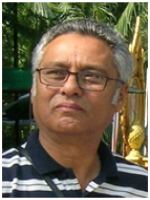Creation and Criticism
ISSN: 2455-9687
(A Quarterly International Peer-reviewed Refereed e-Journal
Devoted to English Language and Literature)
Vol. 01, Issue 02 : July 2016

The Making of A Creative Artist
“My Desire Will Awaken My Destiny”- Syed Ali Hamid
Syed Ali Hamid: In Conversation with Sudhir K. Arora
Growing up
is to grow wings
and learn to fly
with the desire
to touch the sky. (The Ontology of Desire 90)
It is desire that makes a man. Yes, these lines are from the pen of Syed Ali Hamid who is popular for naturalness, cosmopolitan vision and loving heart. His poetry collections include Autumn Rainbow (1993), No Man’s Land (2003) and Desire, Ultimately (2013). His recent poetry collection is The Ontology of Desire: New and Selected Poems (2015), which, besides new poems, contains selected poems from his earlier collections. Critics have high opinion about his poetry.
“Hamid’s poems are existential....” (Jayanta Mahapatra)
“Hamid’s poetry is always rooted in the sensuous world. It is intensely realistic, sometimes erotic....” (Bibhu Padhi)
Hamid’s poetry practices “the alchemy of souls” with stirring success....” (GJV Prasad)
At present, Hamid is working as Professor of English at Kumaun University Campus, Almora in Uttarakhand, India. As a translator, he was awarded by the Uttar Pradesh Urdu Academy in 1990 for his translation of Hemingway’s The Old Man and the Sea into Urdu. The fusion of Lacknavi culture and Almora’s spiritualism makes him a true human being who sings the song of desire—desire for love, peace, joy and freedom.
Professor Hamid has two daughters. He lives at ‘Ehsas’, Ranidhara Road, Almora-263601 (Uttarakhand). He can also be contacted at syedali.hamid2@gmail.com.
Arora: Sir, what makes you compose poems? Do you find any therapeutic value? Is it the poetic inspiration that makes your soul flow through your pen?
Hamid: Dr. Arora, first and foremost, thanks for interviewing me for Creation and Criticism. Yes, I believe that when one is in the grip of poetic inspiration, under the influence of strong emotions, the urge for expression becomes imperative and poetic composition takes place. If you permit me to put it in another way, I would call it psycho-emotional masturbation and that’s its therapeutic value for the poet.
Arora: Can you share with us the influences that helped you in becoming a poet?
Hamid: As a student of Literature, I have read many poets, but I was much influenced by Ghalib, Donne, Byron, Emily Dickinson and Pritish Nandy.
Arora: Sir, you have got your nurturing from amidst the decadent Avadh aristocracy in Lucknow. Lacknavi culture is in your blood. This culture helps you in initiating the outward journey, which appears in your behaviour. Your karma bhoomi is Almora, known for Nature and spiritualism. A poet when comes in touch with nature becomes quiet and makes the inward journey. How do you make the balance between the two and how is it reflected in your poetry?
Hamid: Well, Lucknow has a unique culture, the famous Nawabi culture of refined manners, extreme politeness in conversation and Hindu-Muslim unity, known as Ganga-Jamuni tehzeeb. Even during the Partition, Lucknow remained an island of peace amidst terrible communal violence. That culture is in my blood. My karma bhoomi, Almora, is the spiritual and cultural capital of Kumaun, which has always attracted artists and seekers like Swami Vivekananda, Udai Shankar, Tagore, Swami Krishna Prem and many others. It has made me look within and has enriched me both as a poet and a teacher. I owe a lot to Almora.
Arora: “People recognize my city / wherever I go, / but in my own city I have become / a stranger, a vestigial organ.” Yes, people talk of Lucknow and its culture. Why do you feel alienation in your city? How do you associate your ‘Self’ with the native place? Do you find people lacking in values for which Lucknow is famous?
Hamid: I was born and brought up in Lucknow during the 1950s and 1960s, when Avadh aristocracy was in its last throes of extinction. That culture of the feudal lords died with them. It was re-born in its new avatar sometime in the 1970s when the new generation, mine, that rejected feudalism and cherished democracy, with its ideals of equality, liberty and individual achievement, emerged on the scene and carried forward the culture of Lucknow minus its earlier feudal ideals and accessories. But it seems that people still have a penchant for the aristocracy, which has resulted in imposters masquerading as Nawabs / Nawabzadas / Royals, who are being feted by an indulgent media, resulting in the distortion and commercialization of a dynamic culture, which had adapted itself with ease to the changing times. I carry the city of my birth in me, but there I certainly feel somewhat alienated.
Arora: Sir, you have composed poems on places, natural objects, abstract ideas, festivals, relatives etc. But, contemporary scenario is almost missing in your poetry. Is there any reason?
Hamid: If you mean the socio-political scenario, then that is a fit subject for prose fiction. I have come across some fairly decent poets who have corrupted their muse with bland and lifeless verse on socio-political issues (please see my twin poems on the Mushaira poets). Poets like Faiz and Sahir Ludhianvi are rare examples of the artistic blending of the personal and the political, but in most cases, it lapses into mere propaganda, which is not poetry. I mainly deal with existential issues in my poetry, like freedom, meaning of love / desire, purpose of life etc. I am planning to write a novel in which I will deal with social, political and cultural issues.
Arora: Sir, your area of interest is ‘Translation Studies.’ The task of a translator is not an easy one as he has to go into the very spirit of the author whom he is translating. He cannot do it until or unless he is bilingual and aware of the ethos other than his own. It is generally believed that poetry is difficult to translate because of the stylistic and linguistic paradigms that carry the very ethos. Sir, you have translated many poems of Urdu poets and also one novel, The Old Man and the Sea. Do you feel satisfied with your translation or do you feel that something is lost or do you feel something is gained?
Hamid: Translation is not only concerned with the stylistic and linguistic paradigms; the issue of paramount importance is culture. Translating literature is translating culture. One has to negotiate between the cultures of the Source Language and the Target Language. Without going into the intricacies of translation theory and strategies, I would say that it also involves interpretation to a certain extent and, therefore, there is an element of subjectivity in the translated text. With all its limitations, it is a fulfilling exercise, provided one takes care to maintain as much fidelity to the original as is possible.
Arora: Sir, you have composed ghazal in English. How difficult is it to justify with its components like radif, qafia, matla, maqta etc? Please highlight this process and the components that you keep in your mind while composing a ghazal in English.
Hamid: It was after reading the English ghazals of Agha Shahid Ali, in which he uses the formal characteristics of the Urdu / Persian ghazal, i.e. radif (refrain), qafia (rhyme), matla (the first couplet in which the radif and qafia occur in both lines; in subsequent couplets, they occur in the second line only) and maqta (which carries the poet’s pen-name or takhallus), that I was inspired to write one. The ghazal, in which there is only formal unity, each couplet having a different theme and an independent existence, does not form part of the literary tradition in English; but many poets, starting from John Hollander, have tried their hand at writing, what Agha Shahid Ali calls, ‘real ghazals in English’ with a great degree of success. I have also tried to translate a few Urdu ghazals using the formal features there too. On the whole, it is difficult but exciting.
Arora: Genuine poets remain in oblivion while the pseudo-poets or poetasters, by virtue of connection, position and relation come to light and get name and fame. How do you react to such present scenario?
Hamid: This has always been there to a certain extent; but the hallmark of literary merit is the test of time. Genuine poets survive this test, while the poetasters sink without a trace.
Arora: The FB poetry has emerged in present time. Do you really find all the FB poets genuine? Some of them write poetry for poetry’s sake. They wish to be called poets. What is the future of such poetry?
Hamid: Of course, all these poets are not genuine; very few are. But only the genuine ones will leave their mark on the literary scene while the poetasters and sham versifiers will, as Trotsky stated in another context, go into ‘the dustbin of history.’
Arora: Poetry is not saleable. Most of the poets are self-published. What do you think about this present publishing scenario?
Hamid: Poetry has always had a limited readership; it is fiction that sells. But the lovers of poetry shall always remain. During the last many decades, Prof. P Lal’s Writers Workshop published poetry, which included the poetry of quite a few poets who later became canonical poets. At present, there is no cause for despair, as some prominent publishing houses, notably Authorspress, are publishing poetry and it being sold through websites like Amazon and Flipkart, which have increased its reach.
Arora: Which is more important for you: content or form? What are the ingredients which are essential for the formation of poetic canon?
Hamid: Both are equally important, and there is an intrinsic relation between them; often it is content that dictates the form. But it is genuine poetic inspiration that is paramount and, of course, a feel of the poetic tradition in which one writes.
Arora: You have given a form to desire. Desire has become concrete in your poetry. Desire is what makes destiny. How do you make balance between body (physical desire) and soul (spiritual desire)? How does the sublimation process take place?
Hamid: Many of my poems deal with desire in some form or the other, whether it is erotic desire or desire for freedom. I believe that poetry begins from an abstract idea / feeling / emotion and the poet has to concretize this in order to evoke an emotional response in the reader. That is why I have always tried to use concrete imagery in my poetry. Desire springs from ‘the dark regions of the mind’, the forbidden pleasures, fantasies and it invariably comes into conflict with the monster of respectability, the expectations of society, its morality, double standards. But desire has to be recognized, expressed and realized, to whatever extent possible. Regarding desire for the spiritual, I did give it a try, based on several concepts and techniques floated by religions, but success eluded me and I always returned to erotic desire, albeit in a more refined form, a kind of sadhana, surrender, ‘Zen-like’. This has been my path of the sublimation of desire.
Arora: What is the role of intuition in your poetry?
Hamid: I don’t believe in the ‘divine’ origin of poetry. Poetry comes from deep within, sometimes suddenly, like Joyce’s epiphany, or as they say in Urdu, Aamad. In that sense it can be called intuitive.
Arora: How do you connect ‘Wine and woman’ with desire?
Hamid: Wine enlivens conversation, helps in shedding pretences and inhibitions; and, obviously, there cannot be desire in a man without a woman and vice versa.
Arora: How far is insensitivity of people responsible for the present scenario, dotted with dirty politics in the name of caste, class and religion? How can a poet contribute in the present time?
Hamid: Gone are the days of great leaders like Nehru and Vajpayee. Political discourse has reached an all-time low. People are being divided more and more on the basis of caste and religion. Sycophancy reigns supreme, and has unfortunately crept into the social media too. These days, there are either Modi-bhakts or Sonia / Rahul-bhakts, and they become rather nasty during any political debate. Nobody talks of the basic issues confronting the nation. A poet sings of human sympathy, universal brotherhood, freedom and love. Poetry, or art for that matter, is a humanizing force, which brings love, joy and beauty into life; this is its contribution.
Arora: What is your dream? Do you dream for a world where there should be love and peace and where people should follow the democratic values?
Hamid: I don’t nurture Utopian dreams, but I certainly cherish democratic values, individual freedom and love.
Arora: In this materialistic world, fiction has dominated poetry. It is said that poetry does not pay. How do you see the future of poetry?
Hamid: Poetry has been there since times immemorial and it shall always remain. All the scriptures are in poetry; those who believe in the divine origin of poetry cite this as their testimony. But divine or human, poetry gives the most refined aesthetic pleasure and it touches us deeply as well as philosophically. It is, to echo Wordsworth, ‘the breath and finer spirit of all knowledge,’ and ‘as immortal as the heart of man.’
Arora: Life is a riddle. Would you please share any message with the readers of Creation and Criticism?
Hamid: It is easier to be sincere, but very difficult to be authentic. Poetry and art are attempts towards authenticity, the throwing away of masks, the expression of freedom and love. One’s goal must be to strive towards greater and greater authenticity.
Arora: Thank you very much for sharing your experiences as a poet.
Hamid: Welcome. My warm wishes to the team of Creation and Criticism along with its viewers.
 The Interviewer:
The Interviewer:
Sudhir K. Arora (b.1968) teaches English at Maharaja Harishchandra P. G. College, Moradabad affiliated to M. J. P. Rohilkhand University, Bareilly. He has several significant publications to his credit including Aravind Adiga’s The White Tiger: A Freakish Booker and Cultural and Philosophical Reflections in Indian Poetry in English in Five Volumes.


